
George Plantagenet, Duke of Clarence, was the sixth child and third surviving son of Richard Plantagenet, 3rd Duke of York, and Cecily Neville, and the brother of English kings Edward IV and Richard III. He played an important role in the dynastic struggle between rival factions of the Plantagenets now known as the Wars of the Roses.
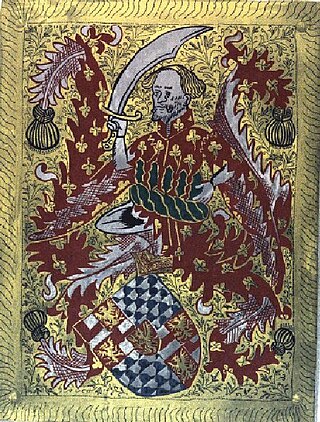
Richard Woodville, 1st Earl Rivers, also Wydeville, was the father of Elizabeth Woodville and father-in-law of Edward IV.
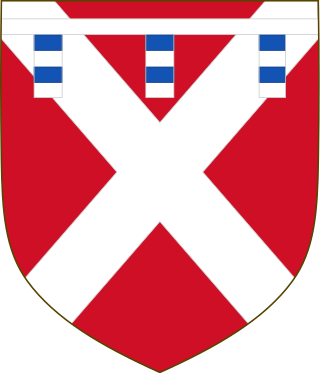
Richard Neville, 5th Earl of Salisbury KG PC was an English nobleman and magnate based in northern England who became a key supporter of the House of York during the early years of the Wars of the Roses. He was the father of Richard Neville, 16th Earl of Warwick, the "Kingmaker".

John Holland, 2nd Duke of Exeter, 2nd Earl of Huntingdon, was an English nobleman and military commander during the Hundred Years' War. His father, the 1st Duke of Exeter, was a maternal half-brother to Richard II of England, and was executed after King Richard's deposition. The Holland family estates and titles were forfeited, but John was able to recover them by dedicating his career to royal service. Earl of Huntingdon, of the Castle, town, manor of Barnstable and manors of Dartington, Fremington, South Molton, Torrington, Devon, Stevington, Bedfordshire, Ardington, Berkshire, Haslebury, Blagdon and Somerset. Holland rendered great assistance to his cousin Henry V in his conquest of France, fighting both on land and on the sea. He was marshal and admiral of England and governor of Aquitaine under Henry VI.
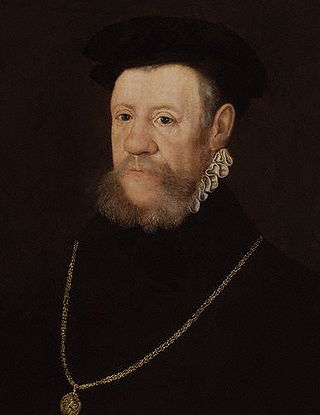
Henry Fitzalan, 12th Earl of ArundelKG was an English nobleman, who over his long life assumed a prominent place at the court of all the later Tudor sovereigns, probably the only person to do so.
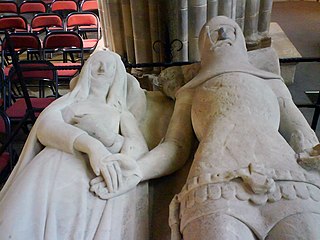
Richard Fitzalan, 3rd Earl of Arundel, 8th Earl of Surrey was an English nobleman and medieval military leader and distinguished admiral. Arundel was one of the wealthiest nobles, and most loyal noble retainer of the chivalric code that governed the reign of Edward III of England.

John Fitzalan, 7th Earl of Arundel, 4th Baron MaltraversKG was an English nobleman and military commander during the later phases of the Hundred Years' War. His father, John Fitzalan, 3rd Baron Maltravers, fought a long battle to lay claim to the Arundel earldom, a battle that was not finally resolved until after the father's death, when John Fitzalan the son was finally confirmed in the title in 1433.
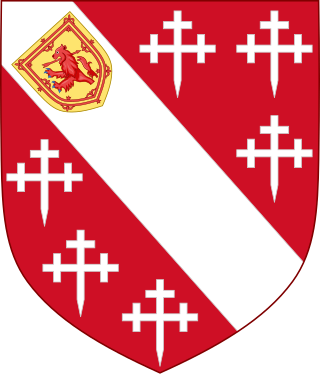
The Howard family is an English noble family founded by John Howard, who was created Duke of Norfolk by King Richard III of England in 1483. However, John was also the eldest grandson of the 1st Duke of the first creation. The Howards have been part of the peerage since the 15th century and remain both the Premier Dukes and Earls of the Realm in the Peerage of England, acting as Earl Marshal of England. After the English Reformation, many Howards remained steadfast in their Catholic faith as the most high-profile recusant family; two members, Philip Howard, 13th Earl of Arundel, and William Howard, 1st Viscount Stafford, are regarded as martyrs: a saint and a blessed respectively.

Henry Grey, Duke of Suffolk, 3rd Marquess of Dorset, was an English courtier and nobleman of the Tudor period. He was the father of Lady Jane Grey, known as "the Nine Days' Queen".

William Paulet, 1st Marquess of Winchester, styled Lord St John between 1539 and 1550 and Earl of Wiltshire between 1550 and 1551, was an English Lord High Treasurer, Lord Keeper of the Great Seal, and statesman.
Sir Thomas Vaughan was a Welsh statesman and diplomat, who rose to prominence before and during the Wars of the Roses. He began as an adherent of Jasper Tudor and King Henry VI of England, and was appointed to several offices by Henry. He was nonetheless a Yorkist by inclination, as were many Welshmen of the time. After the Yorkist victory in 1461 he became a loyal and important servant of King Edward IV. In 1483, he was executed by Richard III as part of his seizure of the throne.

John Talbot was the 2nd Earl of Shrewsbury, 2nd Earl of Waterford, 8th Baron Talbot, KG was an English nobleman and soldier and the son of John Talbot, 1st Earl of Shrewsbury, 1st Earl of Waterford, 7th Baron Talbot, 10th Baron Strange of Blackmere, and Maud Neville, 6th Baroness Furnivall.
Sir John Cheyne, Baron Cheyne, was Master of the Horse to King Edward IV of England and personal bodyguard to King Henry VII of England.

Ockwells Manor is a 13,838 sq ft (1,285.6 m2) timber-framed 15th century manor house in the civil parish of Cox Green, adjoining Maidenhead, in the English county of Berkshire. It was previously in the parish of Bray. The manor used to own most of the land that is now Ockwells Park.
Sir John Norreys was a high ranking Lancastrian, and the head of the branch of the Norreys family who became prominent under the reign of the House of Tudor. He served as Keeper of the Wardrobe for King Henry VI of England.
Sir William Norreys was a famous Lancastrian soldier, and later an Esquire of the Body to King Edward IV.
Events from the 1430s in England.
Richard le Scrope was an English cleric who served as Bishop of Coventry and Lichfield and Archbishop of York and was executed in 1405 for his participation in the Northern Rising against King Henry IV.
Sir William FitzWilliam, of Windsor, Berkshire, was an Irish courtier and Member of Parliament in England. He was Chief Gentleman of the Privy Chamber to Edward VI of England; Deputy Chancellor of Ireland; Lieutenant of Windsor Castle; Keeper of Windsor Great Park and Lord Lieutenant of Berkshire.
Robert Corbet (1383–1420) of Moreton Corbet, Shropshire, was an English soldier, politician and landowner who represented Shropshire twice in the House of Commons of England. A retainer of Thomas FitzAlan, 12th Earl of Arundel, and implicated in his alleged misrule in Shropshire, he accompanied his patron to the Siege of Harfleur and suffered a temporary eclipse after his death.